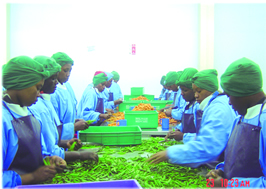Parties, functions an d weddings have been called off and event planners pulled the plug en masse, cancelling all orders of flowers.
d weddings have been called off and event planners pulled the plug en masse, cancelling all orders of flowers.
Flower farmer are staring at disaster if disruptions caused by the coronavirus pandemic continue to august. The pandemic has hit supply chains including major retailers and the event industry.
Local flower farmers discussed with the Floriculture Magazine the devastation the flower farming industry is experiencing due to lack of demand from consumers, cancelled orders from industry outlets and transportation line shutdowns.
“Almost the entire market has collapsed. Technically, our industry has been on lockdown for a while,” said a flower grower, whose business over the last one month has just disappeared.
Since the government declared the pandemic a national disaster and limited public gatherings to 15 people, flower producers ceased almost all of their operations.
Parties, functions and weddings have been called off and event planners pulled the plug en masse, cancelling all orders of flowers.
“Our industry shut down overnight after the government banned social gatherings,” said a grower, who has been farming for almost 20 years and employs 203 full-time workers.
” I think its fair to say that all farmers are very nervous right now about where all markets are heading,” he added.
The coronavirus outbreak has consumers focused on buying necessities like toilet paper, hand soap and food. What their wallets do not stretch to are flowers on their way to the checkouts, and that’s a problem. He said the coronavirus has been a disaster for his business.
“We supply supermarkets, wholesalers and have a national contract with major retailers, but the orders have stopped dead.
” There is no rebound for the farmers – they will have to dump most of their harvests, losing millions of dollars. The coronavirus will impact the entire industry, how much? “I think it’s still up in the air right now,” he said. The farmers said if sales do not recover after the 30-day shutdown they will be forced to close their business and layoff staff.
Industry Statement
About a million people who directly or indirectly depend on the country’s flower industry are facing an uncertain future in the wake of the coronavirus pandemic. With over 30,000 temporary workers already sent home and 40,000 permanent staff on annual leave, the Kenya Flower Council fears that should the pandemic not be contained, the industry would collapse. “We have been losing Sh20 million per day due to the coronavirus outbreak. This is a very huge amount, which makes it very difficult for us to operate,” Clement Tulezi, the Kenya Flower Council CEO, said.
The industry, whose value stood at Sh120 billion in 2019, may shrink to half its value at the close of 2020 should the current situation take five-to-six weeks, according to Mr Tulezi. He added that the likelihood of wage cuts and the laying off of a huge portion of the permanent workers is high.
Valentines' Day
Poor sales during Valentine’s Day, where only half of the targeted sales were made, and the expected low demand on Mothers’ Day in May owing to the coronavirus lockdown effected in numerous countries, have already posed a big challenge to the industry.
The farms are now spraying fertilisers and irrigating farms while cutting the flowers to sustain them which is costly. The farms are harvesting flowers and are shredding them.
Total Lockdown
 Europe’s total lockdown has exacerbated the situation due to the fact that most of the flower output from Kenya is exported to the continent. “Almost the entire market has collapsed. Currently, there is no demand for flowers in Europe. And 70-75 per cent of our exports go to Europe and this has greatly disrupted the supply chain,” said Mr Tulezi.
Europe’s total lockdown has exacerbated the situation due to the fact that most of the flower output from Kenya is exported to the continent. “Almost the entire market has collapsed. Currently, there is no demand for flowers in Europe. And 70-75 per cent of our exports go to Europe and this has greatly disrupted the supply chain,” said Mr Tulezi.
A majority of the remaining 30 per cent of the market is catered for by the US and Asian economies such as China, United Arab Emirates and Japan.
The total lockdown announced by the US has increased pressure on the flower industry. Stakeholders are now worried over the numerous embargoes set by client states. Cases have been reported of flower exports being shipped and destroyed as was the case in The Netherlands. September last year saw the council initiate plans to increase exports to Russia and hopes were high that this would be accomplished this year. However, this projection has so far been curtailed. Mr Tulezi called on the government to step in and salvage the situation before things get worse.
Responsible
“It is time for the government to prove how responsible it is and that it cares for the businesspeople and show that it appreciates their role to the nation. It should honour the tax refunds, close to Sh9 billion that it owes us. The government should expedite the release of this money to the industry,” the chief executive said.
The training levy amounts to billions of shillings that is being withheld by the National Industrial Training Authority (NITA) should also be released without further delay to our members. If the worst come to the worst, and workers are declared redundant, the government should waive tax on their terminal benefits. The government must keep in touch with the stakeholders.
He added that the money would go a long way in stabilising the industry for a couple of weeks.
The Flower Council also called on the government to consider income tax relief for the workers in the industry, corporate tax, the tax charged on input and machinery as well as other levies. They also want the government to allow freight handlers to continue operations unhindered.
“The supply chain is complex. For us to inspire confidence in the market, we have to send positive messages. Though we are going through a difficult time, there is hope,” Mr Tulezi said.
Lessons learned
 There is need to diversify our market and stop relying on European markets alone. In addition, we barely sell one per cent to our local market in Africa, where a flower is more of a luxury. However, from the coronavirus scare, we need to diversify and create more awareness to our local market in the continent. Markets in Asia, South Africa and Egypt are still unexploited.
There is need to diversify our market and stop relying on European markets alone. In addition, we barely sell one per cent to our local market in Africa, where a flower is more of a luxury. However, from the coronavirus scare, we need to diversify and create more awareness to our local market in the continent. Markets in Asia, South Africa and Egypt are still unexploited.
There is also a need to prepare for the pending global recession that would adversely affect our customers in Europe, the next challenge and might force our members to cut down production.
Some of our members have bank loans. The government, now more than ever before, needs to bail out these companies by talking to banks to adjust their loan repayments and interest rates. Most of the farms will soon close their operations and will not be able to service their loans. These loans should be suspended until the situation gets back to normal.


